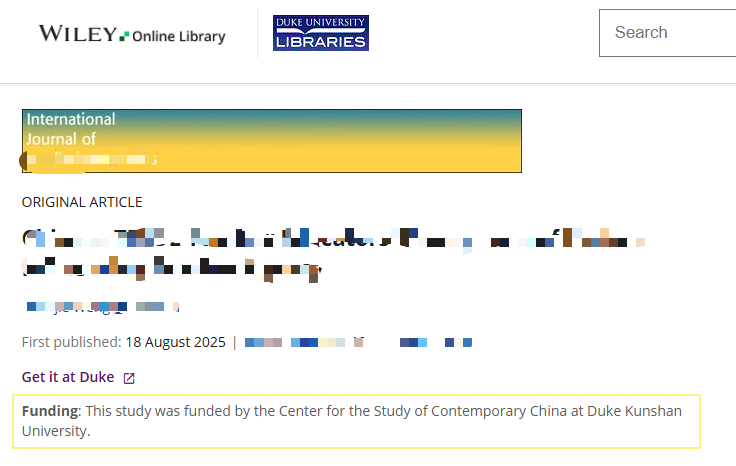CSCC Faculty Research & Creative Activity Grant (Max. 5,000 USD)
Submission Deadline: October 31, 2025
Award Notification Date: within six weeks
This grant provides funding support for full-time DKU faculty to engage in projects on contemporary China that will significantly advance their professional development and field of research, scholarly or creative work. Proposals are reviewed by the CSCC Faculty Grant Review Committee, which makes funding recommendations to the CSCC Co-Directors. The project duration should not exceed two years.
Eligibility
Application Material
To apply, submit one PDF file consisting of:
Applicants should not assume reviewers are familiar with the details of their scholarly work and must offer sufficient background information to assist the reviewers. Avoid using technical jargon.
Additionally, CSCC Faculty Research & Creative Activities Grant applicants must indicate if the activity can be accomplished within two years. If not, they must demonstrate that other support is available to sustain the continuation of the work over the necessary timeframe.
Preference will be given to projects with a tangible plan to apply for larger external research funds.
Deadlines
Evaluation Criteria
Institutional Review Board Approval
Grant Responsibilities
If awarded the grant, all publications, conference posters or presentations, or other means of dissemination resulting from work supported by a CSCC research grant should acknowledge funding from the Center for the Study of Contemporary China, Duke Kunshan University, see example below.

Grant recipient needs to submit a mid-project report and a final project report. Both reports should be max 2 pages (single-spaced) and detail the progress and outcomes of the project.
All spending authorization approval requests in the ERP online system must attach the approved grant budget demonstrate alignment between the proposed spending and the objectives of the awarded project. This documentation may include, but is not limited to, invoices, quotations, and detailed descriptions of the expenses. Please ensure that all required documents are complete and accurate to facilitate the approval process.
Grantees are allowed to modify up to 10% of the total grant award for expenses not originally outlined in the approved budget. Requests for modifications exceeding this limit, due to extraordinary circumstances, will be considered on a case-by-case basis. To request a budget modification, grantees must submit an updated budget and a rationale for the changes, which will be reviewed by the CSCC co-director for approval.
Questions?
All grant proposals and inquiries should be sent to Chi Zhang, the program coordinator for the Center for the Studies of Contemporary China.
List of CSCC Research Grant for Faculty Research & Creative Activity Projects